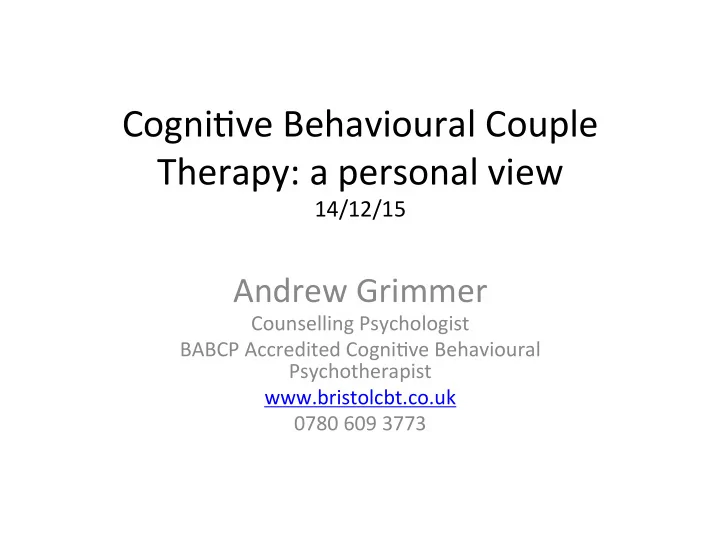

Cogni&ve Behavioural Couple Therapy: a personal view 14/12/15 Andrew Grimmer Counselling Psychologist BABCP Accredited Cogni&ve Behavioural Psychotherapist www.bristolcbt.co.uk 0780 609 3773
Introduc&on • Jacobson & Margolin (1979). Marital therapy: Strategies based on social learning and behavior exchange principles • Jacobson & Christensen (1996). Integra8ve couple therapy: Promo8ng acceptance and change . • Epstein & Baucom(2002). Enhanced cogni8ve- behavioral therapy for couples: A contextual approach . • DaSlio (2009). Cogni8ve-behavioral therapy with couples and families: A comprehensive guide for clinicians . www.bristolcbt.co.uk 2
Assessment 1. How distressed is this couple? 2. How commiVed is this couple? 3. What are the issues that divide them? 4. What makes these issues such a problem for them? 5. What are this couple’s strengths? 6. What can treatment do to help them? www.bristolcbt.co.uk 3
Distress • Reflec&ve ques&on 1 – What are the signs that a rela&onship is a happy or unhappy one? • Task 1 – Engage the couple – Manage their interac&ons – Validate the distress of each partner – Iden&fy the presen&ng issue www.bristolcbt.co.uk 4
Commitment • Reflec&ve ques&on 2: What are the pros and cons of being in a rela&onship? • Task 2: assess mo&va&on and each partner’s agenda www.bristolcbt.co.uk 5
Issues • Reflec&ve ques&on 3: what do couples fight over? • Task 3: assess areas of disagreement and division (don’t forget sex!) www.bristolcbt.co.uk 6
Formula&on • Reflec&ve ques&on 4: What turns a difference or disagreement into prolonged conflict or unhappiness? • Task 4: assess couple dynamics – assess couple fit (reason for being together) – develop problem formula&on – ascribe posi&ve intent www.bristolcbt.co.uk 7
From love to war • The Theme – What is it about my partner that means I'm not geSng my needs met (and what is it about me that means they're not geSng their needs met)? • Polarisa&on – Maladap&ve coercive paVerns of influence • Mutual trap – We can’t go on like this but we can’t give up either www.bristolcbt.co.uk 8
Situation Thoughts Thoughts Feelings Behaviour Behaviour Feelings Physical Physical www.bristolcbt.co.uk 9
Strengths • Reflec&ve ques&on 5: what makes a rela&onship resilient or fragile? • Task 5: assess couple protec&ve factors, resources and deficits www.bristolcbt.co.uk 10
Treatment • Reflec&ve ques&on 6: what would you want from a couple therapist (and what would you not want)? • Task 6: develop and propose a shared plan for therapy based on acceptance and change www.bristolcbt.co.uk 11
Acceptance • Generate in&macy through empathic joining • Communicate effec&vely • Manage emo&onal arousal • Revise unhelpful percep&ons • Explore the impact of distressed interac&ons on each partner and wider family www.bristolcbt.co.uk 12
Change • Behaviour change • Dyadic stress management • Problem solving/conflict management www.bristolcbt.co.uk 13
Thank you • Any further thoughts or ques&ons? Andrew Grimmer Counselling Psychologist BABCP Accredited Cogni&ve Behavioural Psychotherapist www.bristolcbt.co.uk 0780 609 3773 www.bristolcbt.co.uk 14
Recommend
More recommend